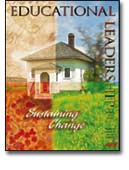Now in its fifth edition, Literature as Exploration by Louise Rosenblatt (1904–) defines the phrase "classic in the field." University of Chicago professor Wayne C. Booth (1995) describes the powerful influence of Rosenblatt, stating that no other critic has influenced more teachers in their approach to reading and teaching literature.
Rosenblatt stressed the importance of the relationship between the individual student and literature. In so doing, she helped develop the transactional and reader-response theories that have guided generations of language arts teachers as they sought "to foster fruitful interactions—or, more precisely, transactions—between individual readers and individual literary texts" (Rosenblatt, 1995, p. 26).
Literature as Exploration is not among the Books of the Century solely for its role in the language arts field, however. Like other subject specialists in the late 1930s, Rosenblatt sought to integrate secondary school content into the larger educational mission of "democracy as a way of life." With others, Rosenblatt redesigned secondary school curriculum—not merely to teach English, arithmetic, science, or history, but to draw out the importance of this knowledge for a free society.
In the mid-1930s, Rosenblatt worked for the Progressive Education Association's Commission on Human Relations, one of three commissions involved with that organization's legendary Eight Year Study (1932–1940), a nationwide effort to experiment with new forms of secondary education. Rosenblatt helped researchers publish a group of books that addressed issues of family relations, human development, and psychology for late high school or early college readers.
Literature as Exploration, first published in 1938, grew out of this work as Rosenblatt came to see the reciprocal nature in the act of reading and viewed meaning as neither in the text nor in the reader. Her transactional theory celebrated reading as an active event. Moreover, her belief in democracy and its central role in the classroom has never wavered: Literature . . . helps readers develop the imaginative capacity to put themselves in the place of others—a capacity essential in a democracy, where we need to rise above narrow self-interest and envision the broader human consequences of political decisions. (Rosenblatt, 2000)
We invite all educators to re-examine this powerful and poignant classic.
In Their Own Words
The teacher of literature, above all, needs to keep a firm grasp on the central fact that he is seeking always to help specific human beings—not some generalized fiction called the student—to discover the pleasures and satisfactions of literature. The teacher's job, in its fundamental terms, then, consists in futhering a fruitful interrelationship between the individual book or poem or play and the individual student. The teacher is dealing with a necessarily fluctuating and dynamic problem. His material is no less than the infinite series of possible interactions between individual minds and individual literary works.
—Louise Rosenblatt, Literature as Exploration
